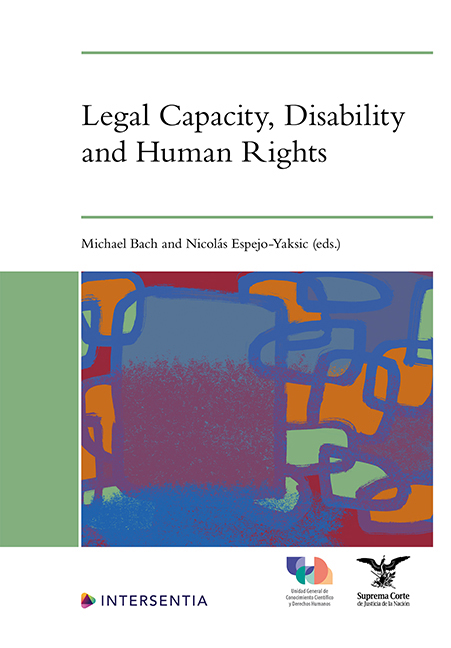Book contents
- Frontmatter
- Foreword
- Acknowledgements
- Contents
- List of Cases
- List of Contributors
- Legal Capacity, Disability and Human Rights: Introduction
- PART I HISTORICAL PERSPECTIVES AND THEORETICAL FRAMES
- PART II LAW REFORM: COUNTRY AND REGIONAL PERSPECTIVES
- PART III LEGAL QUESTIONS, PERSISTENT CHALLENGES
- Index
- About the Editors
Informed Consent and Support for Decision-Making: A Critical Review of Legal Reforms in Latin America
Published online by Cambridge University Press: 03 April 2024
- Frontmatter
- Foreword
- Acknowledgements
- Contents
- List of Cases
- List of Contributors
- Legal Capacity, Disability and Human Rights: Introduction
- PART I HISTORICAL PERSPECTIVES AND THEORETICAL FRAMES
- PART II LAW REFORM: COUNTRY AND REGIONAL PERSPECTIVES
- PART III LEGAL QUESTIONS, PERSISTENT CHALLENGES
- Index
- About the Editors
Summary
INTRODUCTION
Persons with intellectual and cognitive disabilities (hereinafter PICDs) face significant barriers when accessing health treatment and satisfying their right to enjoy the highest possible standard of health . This is worrying to the extent that these persons also experience a greater need for such treatments and have higher mortality and morbidity rates than the rest of the population. These difficulties impact access to health promotion policies and curative health treatments, and include, for example, inadequate time allocation by health care workers, discrimination, lack of reasonable adjustments or poor accessibility to premises and health systems. These barriers also affect the ability to select health care treatment and to control how it is provided. The latter affects PICDs in a particularly acute way due to a diversity of factors, which include, on the one hand, barriers associated with their impairments, such as those that affect communication, perception or memory, and, on the other hand, barriers socially constructed in their environment, which include, among others, paternalistic attitudes, lack of support from their caregivers and lack of expertise and training of health care workers, which often leads to discrimination and mistreatment.
To the extent that historically, PICDs have been subjected to regimes of legal incapacity where they are appointed a representative to make decisions for them on property and personal matters – as is the case with interdiction and guardianship in Latin America –, health legislation has relied on these institutions to determine who should make decisions regarding their health treatment. with the emergence of the debate on the need to provide informed consent (hereinafter IC) in the second half of the 20Thcentury, which reconstructs the doctor-patient relationship in terms of individual autonomy, the question has arisen about how PICDs can authorise health treatment. The default legal response, to the extent that IC appears as a personal legal act, is that if the person is under a regime of legal incapacity, the person who must provide IC as a substitute is their legal representative.
- Type
- Chapter
- Information
- Legal Capacity, Disability and Human Rights , pp. 301 - 318Publisher: IntersentiaPrint publication year: 2023



